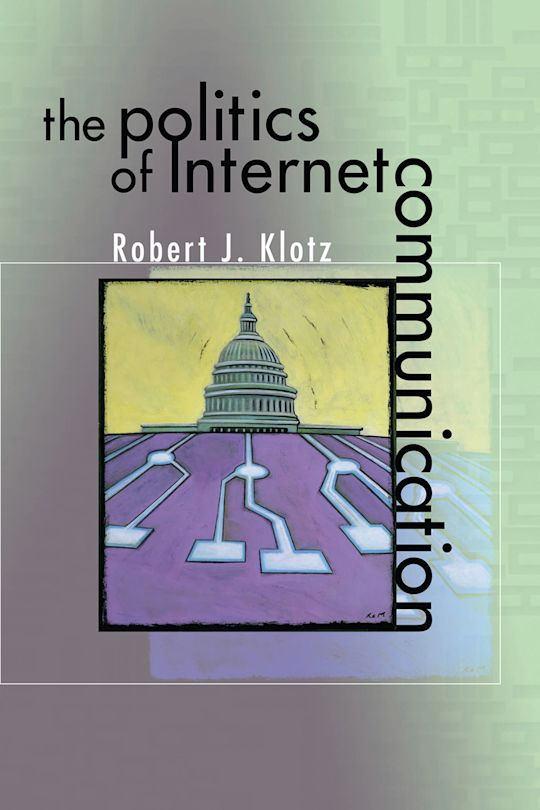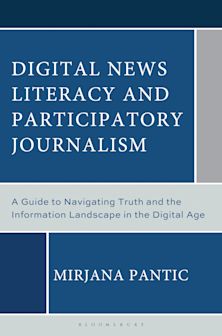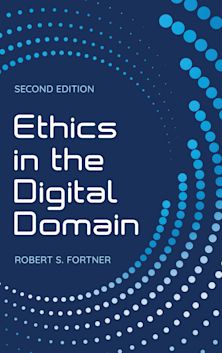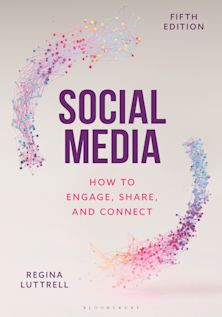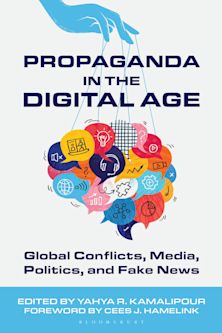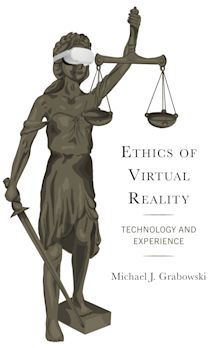- Home
- ACADEMIC
- Communication Studies
- Digital and New Media
- The Politics of Internet Communication
This product is usually dispatched within 1 week
- Delivery and returns info
-
Free US delivery on orders $35 or over
Exam copy added to basket
Choose your preferred format. Please note ebook exam copies are fulfilled by VitalSource™.
You must sign in to add this item to your wishlist. Please sign in or create an account
Description
This concise book explores the wide range of topics at the intersection of politics and the Internet. Recognizing the changes in the Internet over time, Klotz provides an innovative analysis of online access, activities, advocacy, government, journalism, and social capital. The politics of the Internet is considered along with politics on the Internet. A highlight is the in-depth discussion of cyberlaw that provides an accessible framework for understanding the legal treatment of key issues such as music file-sharing, privacy, terrorism, spam, pornography, and domain names. Examples from the 2002 midterm elections and the early 2004 campaign fundraising success of Howard Dean add currency to the debate about the impact of the Internet on democratic politcs.
The author conveys the vitality and humor of Internet politics in a way that readers will enjoy. From impassioned debate about imaginary legislation to the animal rights group PETA's lawsuit taking peta.org from "People Eating Tasty Animals," Klotz brings the colorful history of the Internet to life. Written from an interdisciplinary perspective, the book is infused with original longitudinal data, examples, online resources and landmark events that reveal how the Internet is enriching both public and private life.
Table of Contents
Chapter 3 1 Characteristics and Development of the Internet
Part 4 Part I Politics of Internet Access
Chapter 5 2 User Base of the Internet
Chapter 6 3 Impact of Internet Use
Chapter 7 4 Internet Access Policy
Part 8 Part II Political Advocacy on the Internet
Chapter 9 5 Cybercampaigning
Chapter 10 6 Party and Group Advocacy on the Internet
Part 11 Part III Government and Media Use of the Internet
Chapter 12 7 E-Government
Chapter 13 8 Journalism and the Internet
Part 14 Part IV Legal and Regulatory Framework
Chapter 15 9 Fundamentals of Cyberlaw
Chapter 16 10 Content Regulation
Chapter 17 11 Domain Name Law
Chapter 18 12 Piracy and Privacy in Cyberspace
Part 19 Part V Global Landscape of Internet Politics
Chapter 20 13 The Internet in Global Democracies
Chapter 21 14 Walls and Ladders in Nations Limiting Political Freedom
Chapter 22 Conclusion: Net Gain for Democracy
Product details
| Published | Dec 09 2003 |
|---|---|
| Format | Hardback |
| Edition | 1st |
| Extent | 280 |
| ISBN | 9780742529250 |
| Imprint | Rowman & Littlefield Publishers |
| Dimensions | 9 x 6 inches |
| Publisher | Bloomsbury Publishing |
About the contributors
Reviews
-
A good resource providing insight into Internet regulation, government on the Web, and the Internet and political advocacy. Recommended.
Choice Reviews
-
A truly comprehensive overview . . . including cases and controversies, summaries of data, trends, and histories dividing Internet politics into clear eras-all make The Politics of Internet Communication a strong textbook.
Kevin G. Barnhurst, University of Illinois, Chicago
-
The Internet is changing how we do democracy, and The Politics of Internet Communication provides an accessible introduction to the reasons why. In bringing us up to speed on the growth, uses, and impact of Internet communication in democratic politics, Robert Klotz gives us a clear and compelling overview of important developments that will reshape politics in the twenty-first century.
Scott Althaus, University of Illinois, Urbana-Champaign
-
This book is a must-read for anyone who hopes to understand the role of the Internet on democratic politics. Clear, concise, and packed full of useful empirical data and historically rich detail, The Politics of Internet Communication deals with important issues currently debated by scholars and journalists. Klotz's analyses are compelling and his conclusion that the Internet acts to strengthen the relationship between citizens and leaders offers a valuable contribution to the discussion of democracy and mass communications.
Mark Joslyn, The University of Kansas
-
As Net politickers improve in assembling support networks and bringing their collective resources-including intelligence as well as money and volunteer hours-to bear on civic institutions and processes, they may redeem Klotz's optimisim about the Internetas a "Net Gain for Democracy."
Political Science Quarterly
-
Robert Klotz does a fine job describing how the Internet is changing the modern world. He addresses important issues such as how the Internet is revolutionizing the news business and why we need to consider the effects and ethics of Web-based politics. Academics and general readers alike will find this to be a stimulating and useful book.
Philip Seib, University of Southern California









